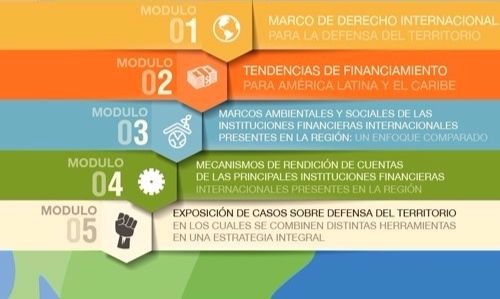During the month of April, the Independent Consultation and Investigation Mechanism (MICI) of the Inter-American Development Bank (IDB) published new guidelines for improvement in its Consultation Phase. It was a participatory process that involved different civil society organizations in the revision of the first draft.
“Below, we offer a google translate version of the original article in Spanish. This translation may not be accurate but serves as a general presentation of the article. For more accurate information, please switch to the Spanish version of the website. In addition, feel free to directly contact in English the person mentioned at the bottom of this article with regards to this topic”
The Independent Consultation and Investigation Mechanism (MICI) is the entity in charge of receiving complaints regarding any project financed by the IDB Group. In this sense, any group of two or more people that is affected by a project financed by these institutions, can go to the mechanism in search of a solution. It should be noted that the complaints submitted should be about non-compliance with the bank’s operational policies and not about other national and / or international regulations.
In order to carry out its task, the ICIM has two functions or phases: (a) Verification of the Observance and (b) Consultation. The complainant may choose to use one or both functions. Verification of the Observance is carried out by the MICI exclusively and it is an investigation regarding the violation of any of the bank’s operational policies. The Consultation involves both those who file the complaint and the party that has taken the loan. This last function is a process similar to mediation and its objective is to achieve consensus among the parties involved to arrive at a solution.
On this second phase, the MICI elaborated a document for internal use that aims to improve the complaint process for those who decide to use this function of the mechanism. In this regard, it should be mentioned that this function must specifically address the needs of the parties involved and the context of the complaint. In these new guidelines, special attention was paid to the affected communities that file the complaint, as well as to the risks and dangers in which they may be involved. This is particularly important since the last few years have made it clear that human rights defenders live in a situation of constant danger.
In this sense, the presentation of a complaint before the ICIM can turn into something that can put at risk the life and / or safety of those who come to the mechanism. The new guidelines try to address this issue by arguing that the ICIM must act in the face of power imbalances, and at the same time ensure that the mediation process is appropriate to the needs of the parties. Within this logic, the guidelines propose to approach the consultation phase attending to six (6) very important principles: (a) the Co-Design of the processes, (b) the Action without Damage, (c) the Good Faith, (d) ) Voluntariness, (e) Sustainability and (f) Attention to Symmetries.
It follows from the latter that the aim of delineating these rules is to improve considerably the complaint process, while strengthening the general policy of the ICIM. We consider that this is a fundamental step in the adoption of better standards that guarantee the rendering of accounts of the financial institutions and the access to an effective remedy by the affected communities. Likewise, we applaud the adoption of these guidelines in consultation with civil society organizations. That made it clear that the MICI is willing to receive feedback from those who position themselves as users of the mechanism and who have been able to glimpse the shortcomings that the processes may have.
More information
Contact
Gonzalo Roza – gon.roza@fundeps.org
Agustina Palencia – agustinapalencia@fundeps.org


